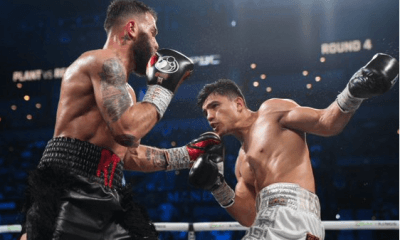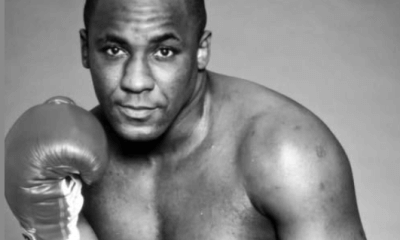Articles of 2009
DECONSTRUCTING MANNY
Manny Pacquiao: I’m just [an] ordinary fighter…
Freddie Roach (interrupting): –You’re not ordinary.
Manny Pacquiao: Sorry about that, master.
“He finds gaps,” said Emanuel Steward after Manny Pacquiao stopped Miguel Cotto in the twelfth round. Those three words mirror the words of a far older, far more legendary war tactician: Sun Tzu. “Strike at their gaps,” The Art of War asserted two thousand years ago, “attack when they are lax, don’t let the enemy figure out how to prepare.” The second knockdown of Cotto illustrated this theory. Cotto, a conventional boxer-puncher, was hit in the fourth round by an uppercut from the left side that went inside and underneath his guard. Pacquiao found a gap, capitalized on the momentary carelessness of an onrushing opponent, and spent the rest of the fight exploding every potential solution Cotto thought he had.
“When you are going to attack nearby make it look as if you are going to go a long way,” Sun Tzu said, “when you are going to attack far away, make it look as if you are going just a short distance.” Pacquiao seems to be moving out when he’s coming in and coming in when he’s moving out. He exploits expectations with illusions. He “draws them in” and then “takes them by confusion.” Trainer Freddie Roach, himself a former professional boxer, agrees that Pacquiao is “very hard to read.” Pacquiao continues punching when his opponent expects a pause, his angles are bizarre, and he is often not where he is expected to be after a combination. Due to such unorthodoxies, this southpaw is a master of destroying the timing and rhythm of a conventional fighter. He is similar to Joe Calzaghe in that regard. Mikkel Kessler said that Calzaghe “ruins your boxing.” Indeed, Pacquiao does worse than that.
While a disruptive boxer like Calzaghe spills ink all over your blueprint and laughs about it, Pacquiao ruins your blueprint, but then adds injury to insult by crashing the drafting table over your head.
THERE’S SOMETHING ABOUT MANNY
Pacquiao has athletic gifts that translate well in the ring: disruptive rhythm, timing, and speed, all financed by shocking power that belies his featherweight frame. As if this weren’t enough, his whiskers safely absorbed the shock of Cotto’s left hooks. He was never hurt, which raises eyebrows. Manny, we must remember, was exchanging punches in a division forty pounds north of the one he began in. And he reveled in it, he invited it, even snarling at times and standing disdainfully in the final stanzas to challenge the manhood of the retreating Puerto Rican. Roberto Duran, 58, watched from the crowd. His coal-black eyes remembering the night he dethroned another welterweight who thought he could outgun a smaller man. Duran watched Pacquiao’s black hair flying with the force of his blows, his beard paying unintentional tribute. A smile, once sinister, betrayed his lips.
Despite the glory heaped on him by a celebrity-starved public and an island nation eager for eminence, Pacquiao is not the flawless fighter that Duran was when he handed Sugar Ray Leonard his first defeat. Pacquiao’s humanity can be sensed if not seen in his nervousness as battle commences. It takes him a round or two to find his rhythm and gauge his distance and timing. Before that happens he is prone to reach in, get off balance in range, and will often leave windows open for counters. After that happens, his opponent, any opponent, is in peril.
He can be controlled, particularly by welterweights, but it will take a trainer and a fighter who are willing to give up conventional strategies and think out of the box. Convention is broken down by revolution, and Manny Pacquiao fights like a revolution.
Alas, even the trainer who recognizes the need for a counter-revolutionary strategy is faced with another problem –the trainer in the other corner:
Freddie Roach. The formidable Freddie Roach.
Roach has Parkinson’s disease, which has burdened him with tremors, slurring, and odd pauses during conversations. Its symptoms can be as disconcerting to conventional conversationalists as Manny Pacquiao’s style is to conventional fighters; but his disability also gives him an aura of alien brilliance like Stephen Hawking.
It has had no effect on his knack for strategy.
Roach did well not to tamper with Pacquiao’s unorthodoxy. He streamlined it and added balance, deliberate feints, angles, defense, and a two-fisted attack. Like Floyd Mayweather Jr., Manny Pacquiao has a foundation in fundamentals. Unlike Mayweather, Pacquiao’s lessons occurred later in his career, while Floyd’s were drilled into him as a small child. Also unlike Mayweather who claims to disdain strategy, Manny enters the ring with a master plan or three. Sun Tzu emphasized this: “Victorious warriors win first and then go to war.” Roach spends hours and days and weeks and months in study. He deconstructs his opponent and finds patterns –“habits” as he calls them, to exploit. Then he teaches Manny to “see it as [he] sees it.”
At times, the eyes of Freddie Roach seem to focus on a higher plane inaccessible to anyone else. Perhaps he communes with the ghost of Eddie Futch. Futch was his mentor, and was among the greatest trainers of the 20th century. Futch sparred with Joe Louis and learned his trade in the company of master boxers like Holman Williams. He was the strategist behind the first defeat of Muhammad Ali by Joe Frazier, the second defeat of Ali by Ken Norton, Riddick Bowe’s defeat of the undefeated Evander Holyfield, and Montell Griffin’s disqualification win over the undefeated Roy Jones. Freddie Roach learned at his knee. Manny Pacquiao learned at Freddie’s.
The most popular boxer in the world today was catapulted into stardom after he defeated Oscar De La Hoya and then Ricky Hatton. Serious boxing fans know the truth. De La Hoya and Hatton were simply two candles on a cake already baked between 2003 and 2008 by great Mexicans from the lower weight divisions: Marco Antonio Barrera, Erik Morales, and Juan Manuel Marquez. These are the men who tried him in fire much like Murderers' Row tried Archie Moore in the 1940s and Philadelphia tried Marvelous Marvin Hagler in the 1970s. Pacquiao has evolved bloodily into a complete fighter and then some. He is an experienced, natural athlete with power that exponentially rises with weight. He has a style that is as confusing as a hall of mirrors and as difficult to solve as Chinese math. He is a willing student with an expanding set of skills. Behind him stands a trainer with a direct link to Eddie Futch who was a product of boxing’s golden decade and rubbed shoulders with many gods of war. Manny’s pugilistic pedigree summons the gold of yesterday to overcome the iron of today.
HAIL MANNY, FULL OF GRACE
Boxing is a character sport first and a skills sport second. Manny’s character was formed in a background that is ideal for a fighter –a background set in the kind of third world poverty that Americans have not known for seventy years, but a background known to spawn fighters in back alleys amid broken bottles and broken dreams. Manny ran away from home at fourteen to spare his mother one more mouth to feed. He exchanged real poverty for worse poverty –in an act of sacrifice. This fighter has not only suffered, he also understood and embraced self-denial at early adolescence.
The toughest sport in the world is easy for someone like him. Pacquiao has something to fight for as only a poor man can, for self, for family, for country. He has the discipline to do it, and he has the perspective to transcend it. The Sweet Science is meaningful to him; his participation in it is an expression of love and loyalty, of self-actualization. So he approaches battle with joy.
And that isn’t all.
Manny believes that the hand of God himself is on his shoulder. Cynical secularism may scoff at such ancient notions, but irreverence is irrelevant here. Manny believes this –utterly. And it gives him an edge in that he is completely self-possessed and palpably unconcerned with the risks of the ring. He goes not only willingly, but happily. Throughout history, like-minded people have strode confidently into lion’s dens, climbed into kamikaze cockpits, blown themselves up at market places, sang while burning at a stake, and volunteered to die first at Nazi death camps to spare strangers. Pacquiao’s religiosity is that kind of powerful. It is a major reason why he smiles and waves on his way to battle dragons.
Boxing fans take note: his frame of mind was shared by Sugar Ray Robinson and Muhammad Ali.
Emanuel Steward’s assertion that the thirty-year-old welterweight champion, now 50-3-2, belongs “up there” with Ali and Robinson was half-wrong. When Robinson was thirty, he was defeated once in 131 bouts and went on to finish his career with the scalps of eighteen world champions hanging from his belt. Manny isn’t near that. He is a typhoon blowing over structures less sturdy than those built in the golden era of boxing. But remember, he isn’t finished yet.
Like the legends before him, Manny Pacquiao sees himself as a man of destiny… a patriot fighting for a flag, a Christian laughing at lions… Such men are rarely taken down by anything except time and hubris. They are larger than their foes even when they are not.
Such men are larger than themselves.
…..
Springs Toledo can be contacted at scalinatella@hotmail.com.
-

 Featured Articles4 weeks ago
Featured Articles4 weeks agoA Night of Mismatches Turns Topsy-Turvy at Mandalay Bay; Resendiz Shocks Plant
-

 Featured Articles2 weeks ago
Featured Articles2 weeks agoAvila Perspective, Chap. 330: Matchroom in New York plus the Latest on Canelo-Crawford
-

 Featured Articles1 week ago
Featured Articles1 week agoVito Mielnicki Jr Whitewashes Kamil Gardzielik Before the Home Folks in Newark
-

 Featured Articles4 weeks ago
Featured Articles4 weeks agoRemembering the Under-Appreciated “Body Snatcher” Mike McCallum, a Consummate Pro
-

 Featured Articles4 weeks ago
Featured Articles4 weeks agoAvila Perspective, Chap 329: Pacquiao is Back, Fabio in England and More
-

 Featured Articles3 weeks ago
Featured Articles3 weeks agoOpetaia and Nakatani Crush Overmatched Foes, Capping Off a Wild Boxing Weekend
-

 Featured Articles3 weeks ago
Featured Articles3 weeks agoFabio Wardley Comes from Behind to KO Justis Huni
-

 Featured Articles2 weeks ago
Featured Articles2 weeks agoCatching Up with Clay Moyle Who Talks About His Massive Collection of Boxing Books















